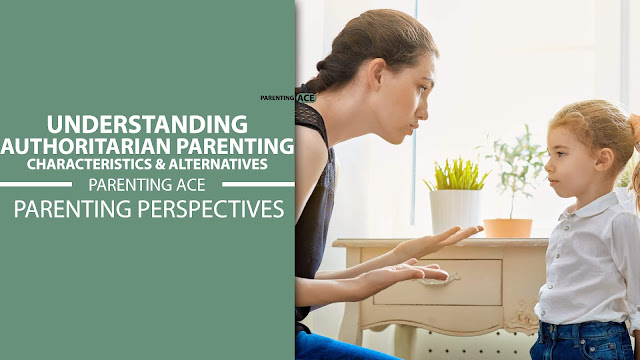Understanding Authoritarian Parenting: Characteristics, Effects, and Alternatives
In the intricate tapestry of parenting styles, authoritarian parenting emerges as a distinct thread, characterized by its emphasis on control and obedience. Yet, beneath its surface lies a complex interplay of influence, shaping not just behaviors but the very essence of a child's development. In this blog post, we unravel the layers of authoritarian parenting, delving into its defining features, its impact on children, and the pathways toward nurturing healthier parent-child dynamics. Join us as we navigate the nuances of this parenting style, exploring its implications and seeking alternatives that prioritize empathy, communication, and mutual respect.
 |
| Understanding Authoritarian Parenting: Characteristics, Effects, and Alternatives |
Parenting styles play a pivotal role in shaping a child's development and future outlook on life. Among the various parenting styles, authoritarian parenting stands out for its distinct characteristics and effects on children. In this article, we delve into the depths of authoritarian parenting, exploring its defining features, its impact on children's development, and alternative approaches for fostering healthy parent-child relationships.
Defining Authoritarian Parenting
Authoritarian parenting is characterized by high levels of control and discipline with little warmth or responsiveness from parents. In this style, parents enforce strict rules and expectations, expecting unquestioning obedience from their children. Communication tends to be one-way, with little room for negotiation or input from the child. Punishments for disobedience are often harsh and punitive, aiming to maintain order and control within the family.
Characteristics of Authoritarian Parenting
- High control and discipline: Authoritarian parents emphasize obedience and conformity, often resorting to strict disciplinary measures to enforce compliance.
- Low warmth and responsiveness: Emotional expression and support are limited, with little emphasis on nurturing the child's emotional needs or individuality.
- Rigidity and inflexibility: Rules and expectations are non-negotiable, with little room for flexibility or adaptation based on the child's unique circumstances or developmental stage.
- Focus on obedience and authority: Authoritarian parents prioritize respect for authority and adherence to rules above fostering autonomy or independence in their children.
Effects of Authoritarian Parenting on Children
Authoritarian parenting can have significant effects on children's development and well-being, including:
- Low self-esteem: Constant criticism and harsh punishments can undermine a child's sense of self-worth and confidence.
- Lack of autonomy: Children raised in authoritarian households may struggle to develop decision-making skills or assertiveness, as their autonomy is consistently undermined.
- Difficulty in social relationships: Limited emotional support and strict rules can hinder a child's ability to form healthy relationships and communicate effectively with peers.
- Resentment and rebellion: Excessive control and lack of warmth may lead to feelings of resentment and rebellion in children, potentially resulting in behavioral problems or defiance.
Alternatives to Authoritarian Parenting
Recognizing the potential drawbacks of authoritarian parenting, many parents are turning to alternative approaches that prioritize empathy, communication, and collaboration. Some alternatives include:
- Authoritative parenting: Similar to authoritarian parenting in its emphasis on structure and rules, authoritative parenting differs in its warmth, responsiveness, and willingness to listen to the child's perspective.
- Positive parenting: This approach focuses on building a strong parent-child relationship through positive reinforcement, effective communication, and mutual respect.
- Democratic parenting: In this style, parents involve children in decision-making processes and encourage open communication and negotiation, fostering a sense of autonomy and responsibility.
Authoritarian parenting, characterized by high control and low warmth, can have lasting effects on children's development and well-being. While this parenting style may achieve short-term compliance, it often comes at the cost of stifling the child's autonomy and emotional growth. By embracing alternative approaches such as authoritative parenting, positive parenting, or democratic parenting, parents can foster healthy, supportive relationships with their children, laying the foundation for their long-term success and happiness.



Comments
Post a Comment